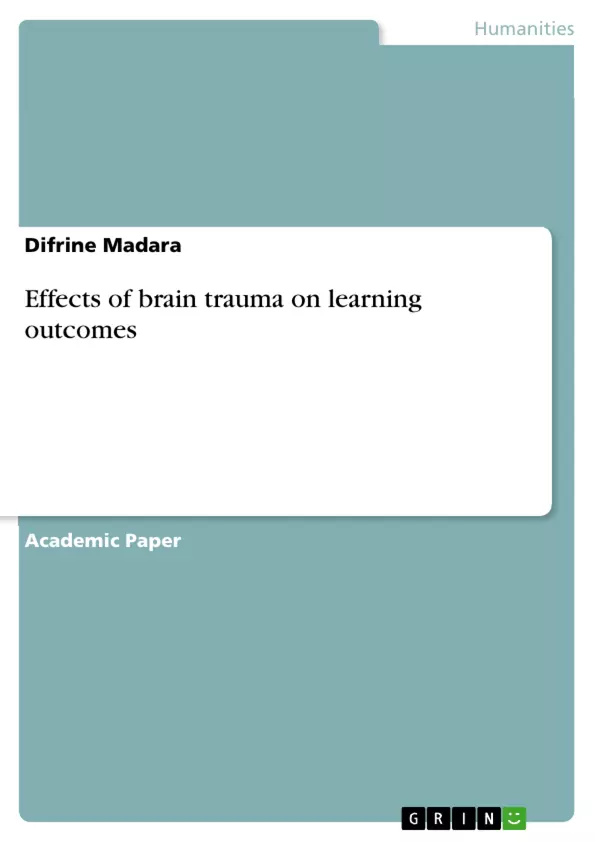Brain trauma can occur at any stage of a person’s life. Among learners, there are several events in their day to day activities, including concussion, maltreatment, physical activities, and toxic stress that may result in brain trauma. Traumatic brain injury may involve a violent blow or jolt on the head. Traumatic brain injury (TBI) can also be caused by an object that is able to penetrate brain tissue. Concussion and other traumatic experiences profoundly limit brain development among children thus hampering their cognitive functions. The growing volume of the literature suggests that concussion adversely impacts various aspects of lives, including home, school, and social relationships among children and adolescents. According to a 2013 clinical report of the American Academy of Pediatrics, there are potential vulnerabilities to academic functioning following concussion. Multiple qualitative studies indicated that children may suffer from several post-concussion symptoms, such as headaches, fatigue, slowed processing of information and impaired concentration, which negatively impact academic performance.
Table of Contents
- Chapter I: Introduction
- Background to the study
- Purpose of the Study
- Research Questions
- Theoretical framework
Objectives and Key Themes
This paper aims to enhance knowledge and understanding of the direct effects of brain trauma on classroom learning. It investigates the impact of brain trauma on students' academic performance and explores the perceptions of teachers and classmates regarding students with TBI. The study also examines the effectiveness of current interventions and identifies areas for improvement in supporting students with TBI in educational settings.
- The effects of brain trauma on classroom learning.
- The academic performance of students with and without TBI.
- Teacher and classmate perceptions of students with TBI.
- The effectiveness of current interventions for students with TBI in school settings.
- The need for evidence-based strategies to support students with TBI's return to school.
Chapter Summaries
Chapter I: Introduction: This chapter provides background information on brain trauma in children, highlighting the prevalence of concussions and other traumatic brain injuries among school-aged children and their significant impact on cognitive functions and academic performance. It reviews existing literature indicating the various post-concussion symptoms, such as headaches, fatigue, and impaired concentration, which negatively impact academic achievement. The chapter establishes the need for further research on effective strategies to support students with TBI in the classroom, emphasizing the inconsistencies in current recommendations and the lack of standardized protocols for managing students' return to school after concussion recovery. The chapter concludes by outlining the study's purpose, research questions, and theoretical framework (the Theoretical Domains Framework, or TDF) which will guide the investigation into the effects of brain trauma on learning in the classroom. The TDF will be used to examine the factors impacting clinical behavior changes and how TBI affects learning outcomes.
Keywords
Traumatic brain injury (TBI), concussion, classroom learning, academic performance, post-concussion symptoms, teacher perceptions, student perceptions, intervention strategies, Theoretical Domains Framework (TDF), evidence-based practices.
FAQ: Comprehensive Language Preview of Brain Trauma and Classroom Learning
What is the main focus of this research paper?
This research paper investigates the direct effects of brain trauma, specifically concussions and other traumatic brain injuries (TBI), on classroom learning. It examines the impact on students' academic performance, explores teacher and classmate perceptions of students with TBI, and assesses the effectiveness of current interventions.
What are the key themes explored in the study?
The study explores the effects of brain trauma on classroom learning; the academic performance of students with and without TBI; teacher and classmate perceptions of students with TBI; the effectiveness of current interventions for students with TBI in school settings; and the need for evidence-based strategies to support students with TBI's return to school.
What is the purpose of the study?
The paper aims to enhance knowledge and understanding of how brain trauma directly affects classroom learning. It seeks to identify areas for improvement in supporting students with TBI in educational settings and to contribute to the development of evidence-based strategies.
What theoretical framework is used in this study?
The study utilizes the Theoretical Domains Framework (TDF) to examine the factors impacting clinical behavior changes and how TBI affects learning outcomes.
What are the research questions addressed in this paper?
While not explicitly stated, the research questions are implicitly addressed through the key themes. The study investigates the impact of TBI on academic performance, teacher and peer perceptions, and the effectiveness of existing interventions. The overarching question is how to best support students with TBI in the classroom.
What is covered in Chapter I: Introduction?
Chapter I provides background information on brain trauma in children, including the prevalence of TBI and its impact on cognitive functions and academic performance. It reviews existing literature on post-concussion symptoms and highlights the inconsistencies and lack of standardized protocols in managing students' return to school after concussion. The chapter defines the study's purpose, research questions, and introduces the Theoretical Domains Framework (TDF).
What are the key words associated with this research?
Key words include: Traumatic brain injury (TBI), concussion, classroom learning, academic performance, post-concussion symptoms, teacher perceptions, student perceptions, intervention strategies, Theoretical Domains Framework (TDF), and evidence-based practices.
What types of data are analyzed in this study (inferred)?
Based on the objectives, the study likely involves analyzing quantitative data (e.g., academic performance metrics) and qualitative data (e.g., teacher and student interviews, observations). The specific data types are not explicitly mentioned but can be inferred from the objectives and themes.
- Citar trabajo
- Difrine Madara (Autor), 2019, Effects of brain trauma on learning outcomes, Múnich, GRIN Verlag, https://www.grin.com/document/961650



